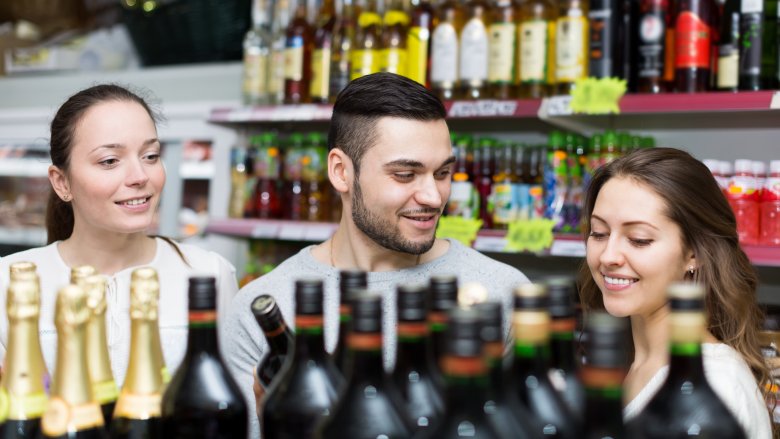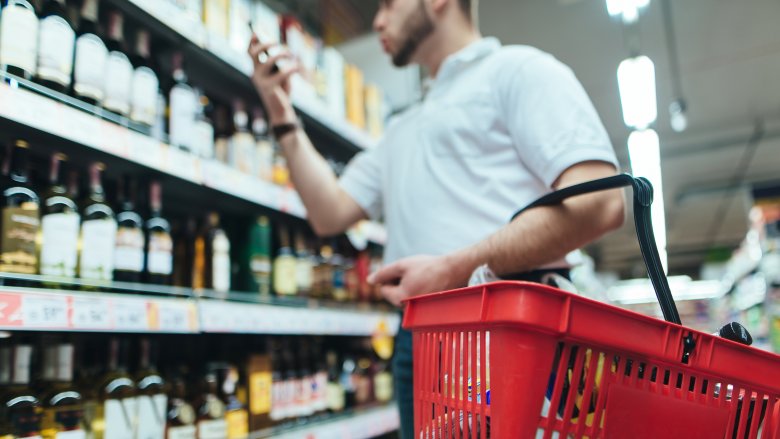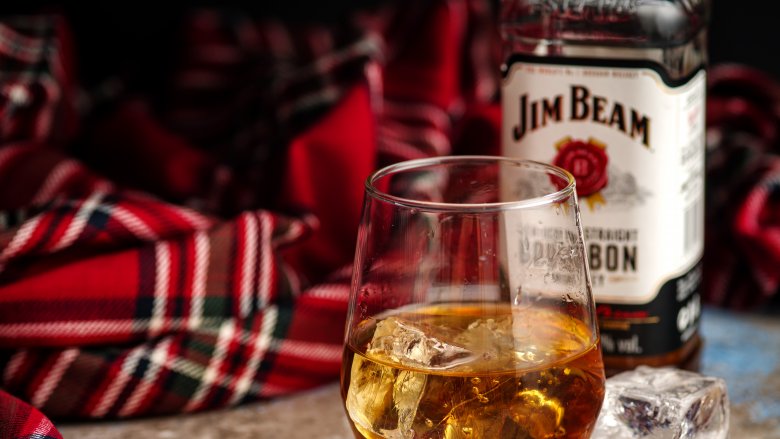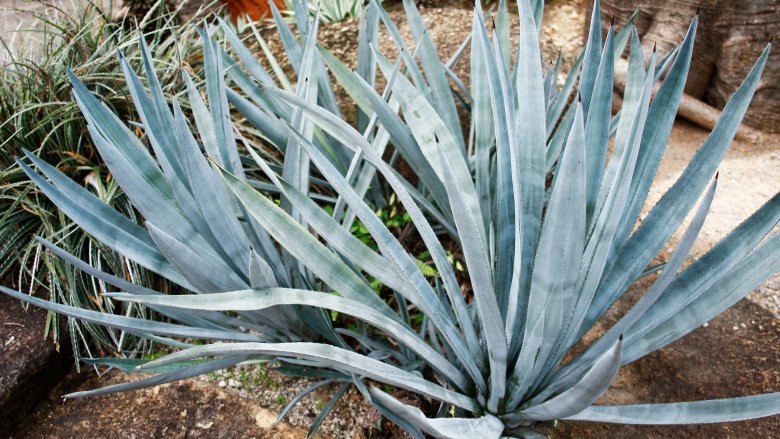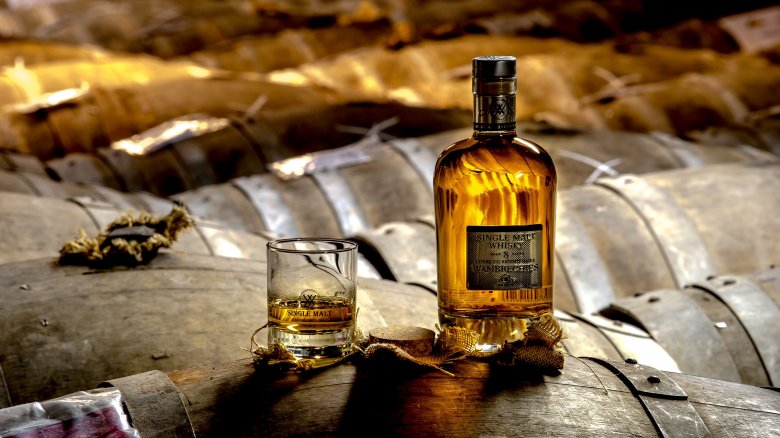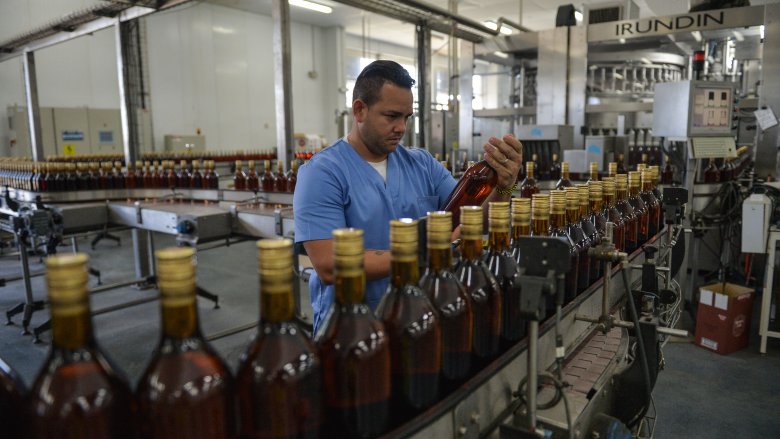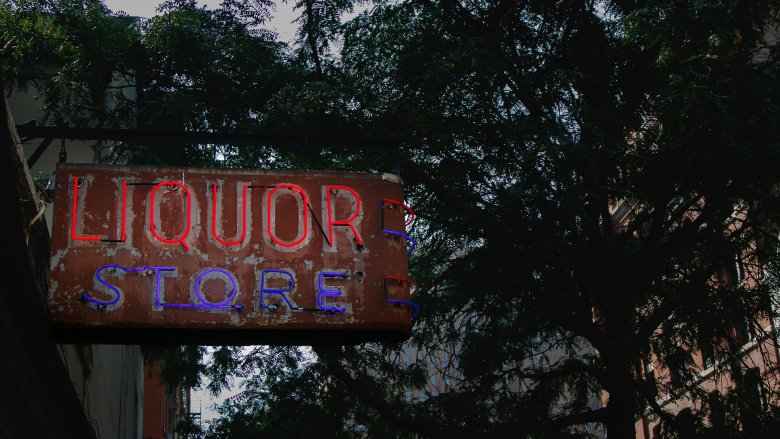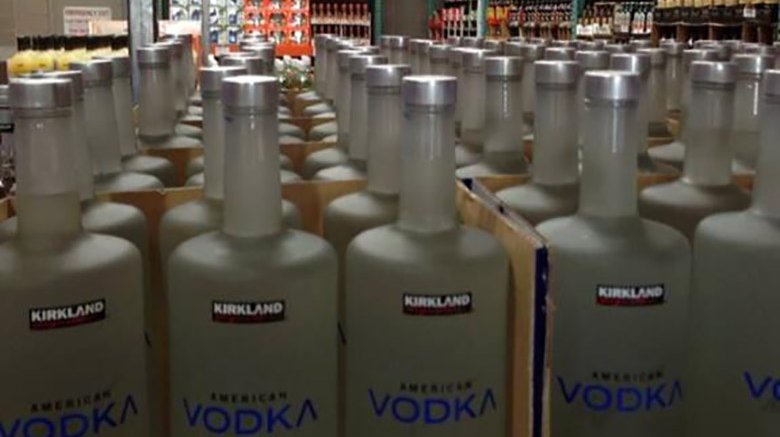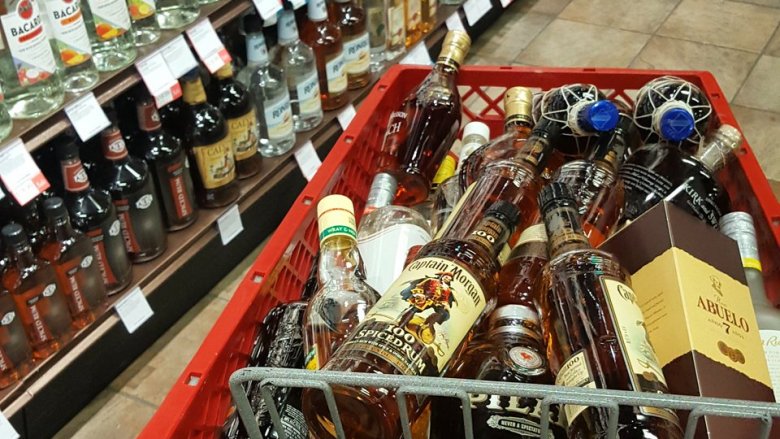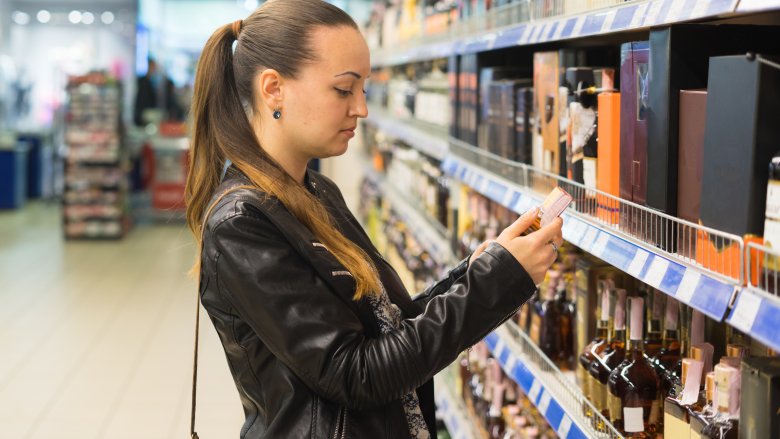Mistakes Everyone Makes When Buying Liquor
Unless you're dead-set on a particular bottle of liquor, walking into a liquor store and figuring out what to buy can be a bit overwhelming. Even if you know that you want a bottle of gin, how do you go about getting the most booze for your buck? With the thousands of bottles on the shelf, it's not exactly as straightforward as picking out a jar of peanut butter at the grocery store.
Every bottle is competing for your dollar using fancy labels or wild bottle shapes to sway your favor, while other brands hope the low price will secure a sale. There are numerous factors to consider from age to ingredients, and even what part of the shelf you grab a bottle from can determine whether or not you're getting a good deal. In order to help make sure your next shopping trip for some spirits doesn't leave a bad taste in your mouth, here are some helpful tips and common mistakes to avoid.
Ignoring the bottom shelf might be a mistake
Walk into just about any liquor store and you'll immediately notice that the least expensive stuff is on the bottom of the shelf, the priciest up top, and the moderate stuff is right in the middle. So the stuff on the bottom must be garbage that's only fit for the college kids looking to get loaded for as cheap as possible, right? Not so fast. You might actually be able to score some decent liquors on the bottom shelf that won't leave your stomach feeling like it's about to crawl its way out of your abdomen.
If you're looking for a bottle of liquor on the cheap, say under $20, asking the store employees is a solid move. They should be able to point you in a good direction. Now of course the bottom shelf does have some pitfalls, but it's largely about what you're shopping for. You're going to be much better off shopping for a bottom shelf gin or vodka then you will for a bottom shelf tequila. "Sometimes, the bottom shelf vodkas can be just as good as the expensive ones," explains Playboy columnist and vodka expert Jason Horn. "For the most part, vodka pricing is based on marketing and image."
Don't just stick with bottles you know
Whether it's whiskey, vodka, or gin, there are certain brands that are synonymous with particular liquors, thanks to slick advertising. While many of these brands put out a reputable product, you could be missing out on some really good and quite affordable spirits by only buying labels that you recognize from commercials and magazine ads. There's nothing wrong with finding what you like and sticking with it, but variety is the spice of life.
The fact that three brands account for 60 percent of rum sales further proves that many of us aren't shopping around for different brands. Ask your friends what they like or better yet, tell the bartender or liquor store employee your usual go-to brand and ask them to recommend an alternative that might be equally appealing. Would you rather choose your rum on your own? Pick up a bottle from a brand you've never heard of and give it a go — what's it going to hurt? Worst case scenario, you now have a rum to use in your mixed drinks.
You might hate tequila because you're buying a "mixto"
Tequila is definitely one of those spirits that you either love or hate with the vengeance of an angry Aztec god for ever allowing it to touch your lips. Even among those who do drink tequila, many of us don't touch the stuff if it's not in a margarita. Tequila could be on your list of forbidden liquors though because you've been drinking the wrong type.
A good tequila is 100 percent made from blue agave plants, but what you could be getting in well tequila at a bar might what tequila experts call a "mixto." This means that only around 51 percent of it is from agave sugars and the rest is a bunch of garbage alcohol and sugars added to cut down on costs. Sometimes caramel coloring is even added to give the mixto tequila the appearance that it's been barrel-aged. As a general rule of thumb, look for a 100 percent agave note on the label. Failure to do so could leave you kneeling in front of the toilet and having unwanted flashbacks from spring break at Señor Frog's.
Age isn't the most important factor for a good whiskey
Buying whiskey can be a little intimidating as just about any liquor store is bound to have a large selection due to the spirits' growing popularity (thank you, Hipsters!). With so many bottles to choose from, how do you ever pick one? Experts say you shouldn't start by looking at the age.
"People have this perception older is always better, which is not always the case," Ewan Gunn, Brand Ambassador for Diageo Beverage Company, told Business Insider. Gunn recommends going by the flavor that you like or are looking for, and says that some newer whiskeys might taste better to your palette than ones that have been aged longer. Now this isn't to say that aging a whiskey isn't important, just that buying the oldest bottle you can find in the shop doesn't necessarily mean it's going to taste better. Age a whiskey in a barrel for too long and the wood begins to dominate the flavor.
Good rum doesn't just come from the islands
The thought of rum might conjure up tiki drinks and Ernest Hemingway-inspired cocktails, but rum doesn't have to be tied down to the islands. Yes, it did originate in the West Indies, but there's no reason that you should only buy rum that was made at a distillery surrounded on all four sides by water. What we're getting at is that pirates and palm trees on the bottle aren't a requirement for a good rum.
"You can make rum anywhere," Kenneth McCoy, a founding partner of New York City bar The Rum House, said. McCoy says both Venezuela and Guyana both have a history of making quality rums and shouldn't be discounted. Award-winning rums are even being made in the United States at places like Charleston's Striped Pig distillery and Maggie's Farm in Pittsburgh. Last time we checked, Pittsburgh was nowhere near the ocean, which proves our point that a tropical breeze isn't a requirement for a quality rum.
Don't ignore the possibility of price matching
With many grocery stores carrying liquor these days and the ability to buy liquor online, it's an extremely competitive market for sellers and you're in the seat to benefit. In order to win over customers, don't discount the possibility of your local liquor store offering a price match.
Shopping around for liquor is obviously a little different than trying to score the best deal on a washing machine, so do your homework. Many liquor stores won't offer price matches for products sold online, but if you bring in an advertisement from another store you may be able to get a better deal. Retailers can even be pretty picky with what qualifies as a competitor and might possibly require that the great deal being offered is within a certain geographic area or be within a particular time frame. That said, if you're willing to put on your haggling hat and can back up those claims of competitor's price, you might be able to score a sweet deal on your next liquor purchase.
Not buying in bulk might be a bad move
If you don't run a bar or aren't putting together a wedding for 150 guests, buying in bulk is a bad move, right? Well, not necessarily. It really boils down to how good the deal is. Because most liquor has an extremely long shelf life, buying in bulk from a warehouse store can actually work out to not be a terrible idea. You had just better be sure that you really like the bottle of liquor you're buying. When you shop at warehouse stores like Sam's Club or Costco for your liquor, you're also likely to save more money if you buy their store brand. Even better, some reputable brands actually produce or partly produce the liquors.
For example, Kirkland's is the in-store brand for Costco and their bourbon and rum is produced by Jim Beam and their vodka has ties to Grey Goose. Even better, Sam's Club will let you buy alcohol without a membership and so will Costco and BJ's stores in certain states. While not everything is going to be a money-saving score at warehouse stores, liquor seems to be one of them.
Buying too much could cost you
Okay, so maybe you're thinking "What's going on, you just said to buy in bulk, now you're backtracking?" We hear your concerns, but what it really boils down to is when you buy more liquor than you're going to use. Let us paint a scenario for you. Let's say you buy way more liquor than you need for an event, and head to the store the next day to return the leftover bottles for a refund. Well, unfortunately, you're probably not going to be getting your money back.
Internet shopping has perhaps made us all a little too comfortable with returning unwanted items, but most of the time you can't return liquor — even if it's been unopened. Many states such as Michigan for example, have this rule because "individual customers aren't licensed to sell alcohol, and a refund is technically a sales transaction." D'oh!
Following the repeal of Prohibition in 1933, states are free to create their own laws regarding the return sale of alcohol and the ones that do allow it often leave it up to the discretion of the liquor stores. Considering that many liquor stores would probably rather not take the chance that the booze has been tampered with, unless you can prove it's unfit for consumption, an exchange of equal or lesser value might be your only option. Stay safe buy only buying large amounts of liquors you know you like — and can eventually use.
Failure to take advantage of tastings
With the thousands of different bottles on the shelf at a liquor store, picking a bottle that you're going to enjoy can be tricky if you have no idea what it tastes like. The simplest solution might be to ask an employee if they're willing to crack open a bottle for a sample taste. This used to be a big no-no for liquor stores due to state laws, but that's begun to change in the last few years. Virginia followed the lead of New Jersey, Vermont and Maine in 2010 and made the decision to allow in-store tastings — and other states continue to follow their lead. The update to such laws offers customers more opportunity to make an informed decision and the retailer to make an easier sale. Win-win, baby!
"We find tastings to be a very important tool that enables consumers to try premium spirits products and often leads them to purchase them," said Jack Shea, a representative for Pernod Ricard USA (Malibu Rum and Absolut Vodka). Of course, if you're going to ask the store employee to open up a couple different bottles for you to get a taste, you had better be ready to buy something — otherwise you're likely to just come off as a cheap mooch.
